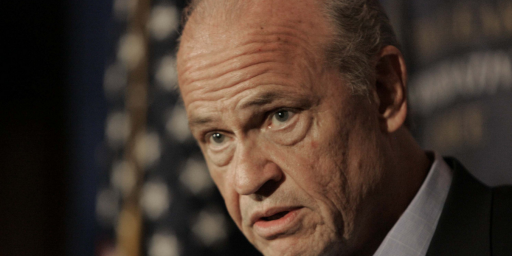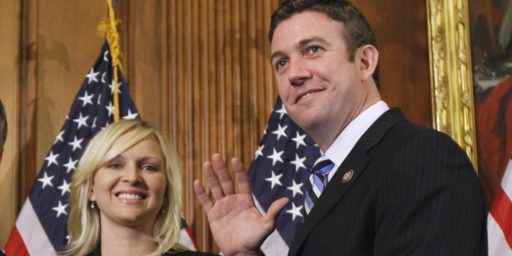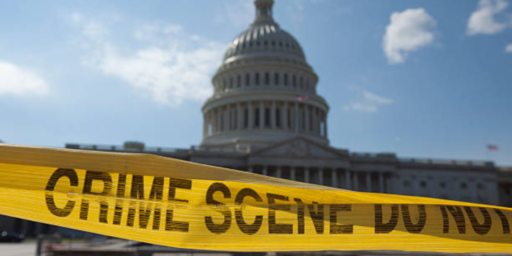Real Debates with Real Candidates
William Bradley is already bored with the presidential debates.
It’s time for fewer presidential debates with fewer candidates. And real debates, not these freeze-dried forums in which candidates give sound-bite answers that are overly parsed by a media settling for the trivial pursuit of degrees of difference. It’s time to drill down into the big issues with the candidates, the candidates who have realistic chances to win, that is, and get them to engage in a serious back-and-forth.
As a political junkie who has seen perhaps 20 minutes, cumulatively, of the debates thus far, I concur. Unfortunately, turning the theory into reality is rather complicated. With four or five months to go before the first delegates are awarded (South Carolina has shifted its primary to mid-January, which is expected to create another reshuffling of the schedule, including perhaps moving the Iowa Caucuses to December!) and fifteen months before the actual election, it’s still rather early to start writing off candidates.
Bradley wants to be ruthless in that regard:
Tommy Thompson, you’re the wrong Thompson. Tom Tancredo, your one issue of anti-immigration is already co-opted. Duncan Hunter, you were a big wheel as House Armed Services chairman. But a presidential campaign isn’t an act of decompression. Ron Paul may be the fastest runner ever to run for president (I’m told he ran a 9.7 second 100-yard dash back in the day), but all his campaign is accomplishing is reminding us that Internet polls aren’t exactly scientific.
Let’s put Rudy Giuliani, Fred Thompson, assuming he gets around to running, Mitt Romney, and John McCain up there and let them have at it.
On the Democratic side, Dennis Kucinich is a good guy. I like him. He’s running the same anti-war campaign he ran in 2004. The high water mark of which was his carrying Maui. Wowie.
Mike Gravel is entertaining, but in what way is he a real candidate for president? Sure, he was a U.S. senator. Back in the ’70s. From Alaska. Which then had fewer people than most California counties you’ve heard of.
Joe Biden and Chris Dodd are major U.S. senators, chairs of the Foreign Relations and Banking committees. Biden wants to talk about his plan to partition Iraq. He already has the forum to do that. Dodd always wanted to run for president. He’s finally gotten around to it. Maybe in a different year, these two credible senators would be real contenders. But not this year. This year, there are four real contenders.
Let’s put Hillary Clinton, Barack Obama, John Edwards, and Bill Richardson up on stage and see what they can do when they’re not limited to the short, essentially unrevealing answers we’ve been getting.
Now, I totally agree on Tancredo, Hunter, Kucinich, and Gravel. They’re essentially vanity candidates who must know they have no shot at the White House. It’s hard to fathom how Biden or, especially, Dodd could break out of the pack, too. But, surely, they’re sufficiently prominent and distinguished to have earned the right to sit on the stage with the big boys?
Ron Paul isn’t going to win, either, the enthusiasm of his Internet legions notwithstanding. But he brings serious ideas and arguments (along with some unserious ones, admittedly) to the table. Don’t the “debates” benefit from his presence?
Presidential debates have been too tightly scripted during my political memory, actually getting worse over time. That’s unlikely to change, though. Nor, frankly, is it clear that being a good debater — which mostly requires the ability to think on your feet and give quick, glib responses — has much to do with being an effective president.
I will say, though, that there has been a positive development in this round of debates: The advent of several single issue area fora. Race relations and gay rights, the topics thus far, are probably not the most significant challenges our next president will face. But there’s no reason we couldn’t have similar roundtables on terrorism, international diplomacy, health care, and other serious topics. That, rather than a mishmash of random questions chosen by journalists, might yield more substance.
Or, just as likely, more canned responses with planned zingers. After all, the most memorable lines from debates (“You, Senator, are no Jack Kennedy!” or “There he goes again . . . “) are seldom the most substantive.





Ron Paul may be the fastest runner ever to run for president (I’m told he ran a 9.7 second 100-yard dash back in the day), but all his campaign is accomplishing is reminding us that Internet polls aren’t exactly scientific.
And the Scientific polls are not honest since they just leave Ron Paul out of the Poll and give media attention to who they decide should win.
Real debates are far beyond the comprehension and attention span of an electorate favoring hillary & obama.
it’s true, trotting 10 people on stage so they can do what, show us how well they can respond in 30 seconds to questions of national importance is ridiculous.
fewer candidates would be better. lincoln style debates would be better. but i think that limiting it to who’s “realistic” is the wrong way to think about it.
i don’t want networks or beltway pundits deciding who’s “realistic”.
instead, hold a round robin where a tancredo squares off against a ron paul, a giuliani against a thompson, etc.
newt gingrich and mario cuomo talk about the concept at ScribeMedia.Org.
There are some guys who are obviously fringe(Tancredo, Kucinich), but before anyone wants to reduce the fields to three or four, keep in mind that this time in 2003, John Kerry was fifth in the polls.
Bill Clinton was at 1% in the polls this time in 1991.
Any governor or Senator should be considered a legitimate candidate automatically. Others, if they are raising enough money and polling well enough, could be considered legit. of those, probably only Paul qualifies.
Make sure Kucinich isn’t allowed in the debates.
We wouldn’t want any Americans to learn something.
Actually, I think that if Bush had been more articulate and able to give quick, glib responses, he’d have been able to inspire more confidence early on and do a better job of selling his programs than he’s obviously done.
It’s not the whole job but in this day of the 24 hour news cycle and the Internet it’s certainly part of the job.
Actually, I think that if Bush had been more articulate and able to give quick, glib responses, he’d have been able to inspire more confidence
Yea. Here’s another way to put it: If Bush weren’t such a fantastically ignorant half-wit and a petulant imbecile, American democracy might not be in the toilet and the United States might not be the most widely reviled nation on the planet Earth